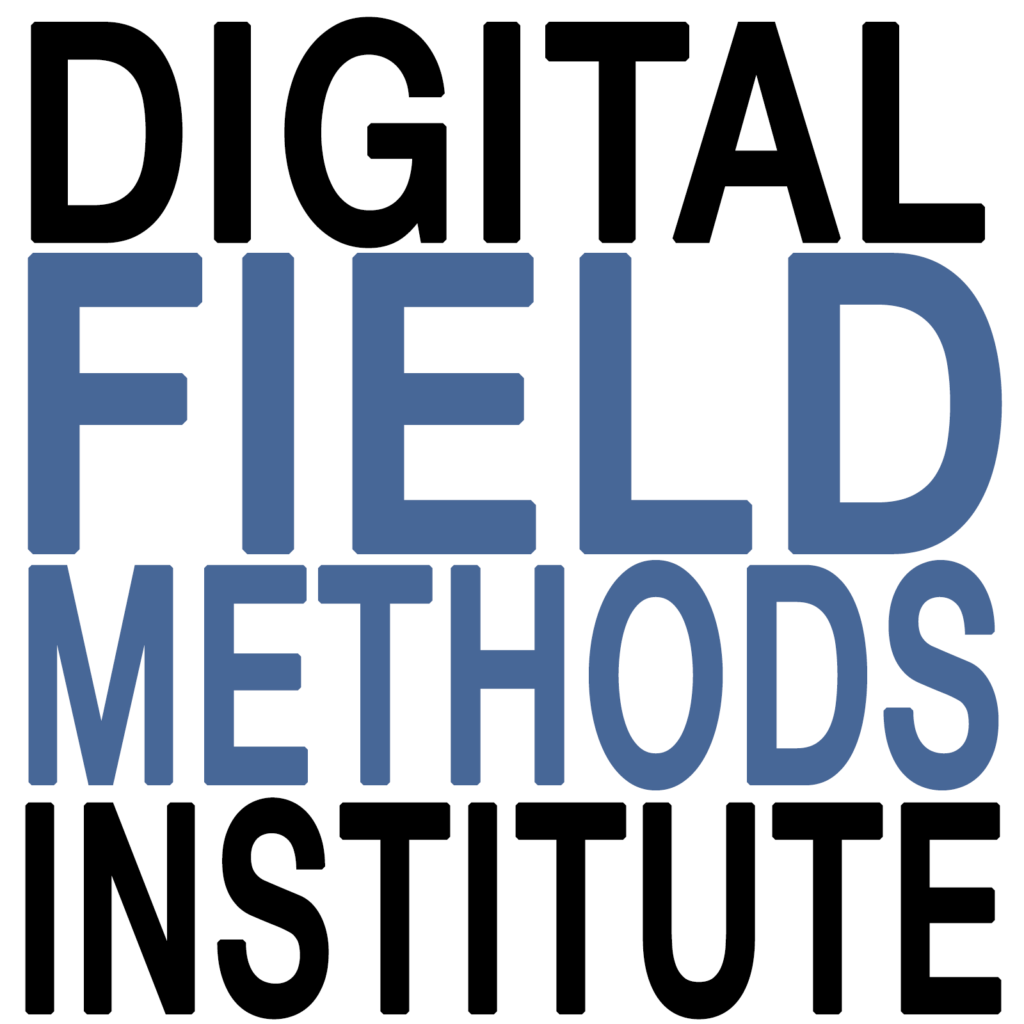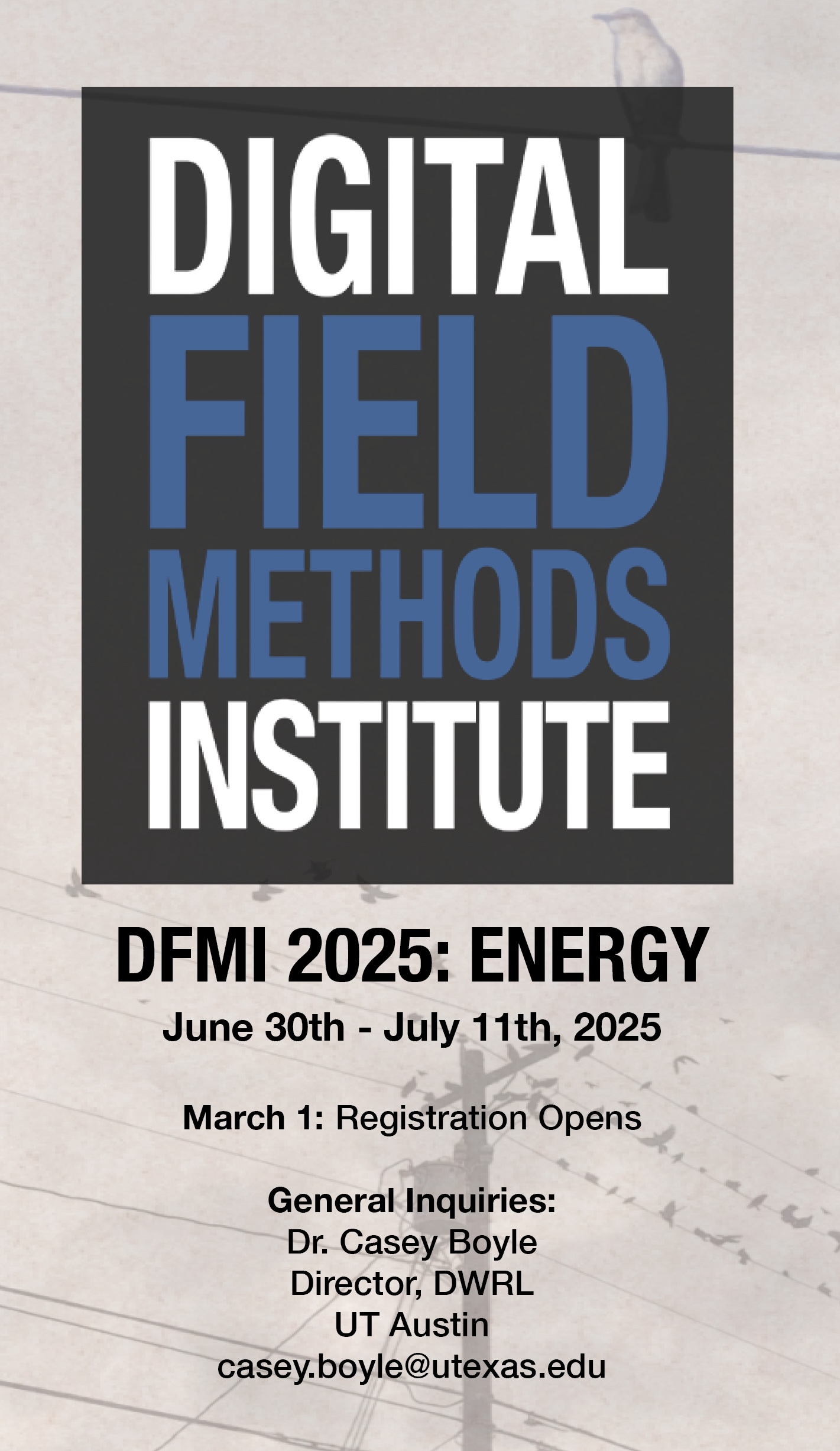
A Summer Workshop Surveying Experimental Digital Methods for Researchers in the Humanities
“We need, in other words, to invent an art of experiment
which can up the methodological ante. I am looking, then, for
a social science which promotes a rewoven empirics which,
most particularly, generates the quality of provocative
awareness. That means an experimentalist orientation must
be in-built which can start and restart association.”
~Nigel Thrift, Non-Representational Theory
The Digital Writing and Research Lab at the University of Texas at Austin will host the Digital Field Methods Institute (DFMI) from June 30 – July 11, 2025. DFMI is an annual event that offers emerging and established researchers opportunities to gain practice collecting, analyzing, and organizing data for publication while providing tools and technologies that participants can explore and experiment towards innovating new methods for scholarly research.
DFMI guides researchers to cultivate and innovate methods for responsible, accessible, sustainable, and inventive research projects that work with and through digital media. The institute takes place both online (June 30 – July 4) and on-site (July 7 – 11) at the University of Texas at Austin, offering a range of shared readings, lectures & keynote talks, discussions, media practice, editing workshops, and project consultations.
DFMI events facilitate robust discussions about digital methodology; organize hands-on practice with digital tools for collecting qualitative digital research data; offer structured practice for processing that data for analysis; and provide extensive guidance for publishing scholarship that incorporate digital artifacts from fieldwork as part of that research’s composition.
DFMI 2025 | ENERGY

The theme of DFMI 2025 is Energy.
We come to know energy through its mechanical, molecular, and material flows: the lights come up, the turbines spin, the dam holds. More acutely, we come to know energy through its failures and discontinuities: the electricity shorts, the rig explodes, the grid goes down, the waste accretes. Energy is charged, and it charges us to negotiate both the necessity of its power and the albatross of its extractive incursions on lands, waterways, and communities. We are, then, always in a state of energy transition; the desperate flux between ever-deepening dependence and ever-dire consequence. Thermal energy is essential for computing infrastructure (Edwards 2020; Hogan 2015; Edwards, Gelms, and Shivener 2023), as molecular movement generates heat. Electrical energy powers blockchain servers, neural networks, and operating systems through electron flow. Sound energy transmits vibrations across digital and physical fields (Hawk 2018; Goodman 2010, 2012), which enables verbal communication, voice recognition, and music. And gravitational energy operates within the deep, underground gas pipeline networks powering our digital systems, all the way up to satellite devices circulating in space—where the push and pull seemingly inherent to matter gains significance.
Energy inheres…
Energy acquires form in what it has the potential to express. The effect of these systems is a site of energy, a synthesis of capacity that functions dynamically to induce change. This inflection reveals the “political, ecological, and all-too-material” provocations of the relationship between rhetoric and energy, as Chris Ingraham attests (2018). Energy impels: the political, ecological, and rhetorical dimensions of energy demand attention as they shape persistent, ambient digitality (Boyle, Brown & Ceraso, 2018). Energy intensifies: the extractive, emissive dimensions of energy mean that we are never outside of the ethical implications of our reliance on complex energy systems. Energy inheres: as a force and a process, energy threads through all of our practices, all of our inquiry, and all of our methods. Finally, energy invites: sustained critique, collective struggle, and rhetorical inquiry.
…Energy impels
Energy also shares roots with the Greek enargeia, as illustrated by Aristotle and Quintilian, and later forwarded by George Kennedy and Ingraham (Kennedy 1992, 1998). As a method, this approach renders our sites of inquiry anew, revealing alternative ways of perceiving and sensing our grounds for research. As a lens for observing the process of experimentation, energy discloses how power emerges through relations—between the site and subject, observer and witness. Energy guides our sense of how experience emerges as a “material resource” across digital networks and online social spaces (Gabrys 2014). It asks us to confront our assurances and assumptions about the force of matter and its potential to shape human activity and nonhuman ecologies. And as much as energy invites new routes for interpreting our world, it does this through obstruction; it requires us to adapt to contexts of restricted, constrained, and limited capacity.
Energy intensifies…
Energy– and/as enargeia–will direct our questions and practices for DFMI 2025. Through such a sense of energy, we grasp at the chance to engage with how field methods and emerging digital literacies are entangled across various domains of practice, creation, strategy, and process. We ask: as researchers, how do we perform, imagine, adopt, and absorb the possibilities foregrounded by energetic flows? What tendencies, capacities, and vitalities emerge alongside—or in contrast to—our methods for sustaining activity, especially in the presence of power and capacity? How do we exercise the resources for experimenting with new modes and media to reinterpret their strengths across different environmental, infrastructural, and intellectual contexts?
Week 1 [Online]: June 30-July 4, 2025
Week 2 [On-site at the University of Texas at Austin]: July 7-11, 2025
Registration is now open! Sign up here.
2025 Speakers
Anne Pasek, “Energy is the Raw Material of the Cloud” (Virtual)
The tech sector is in a tough spot. In their decades-long shift to cloud computing—and most especially the recent and hasty pivot to AI—both senior computer companies and fly-by-night startups have had to pay a far larger share of their own infrastructure costs than in the seemingly immaterial possibilities of the 1990s tech bubble. The name of the game is now data centers, and the rules of this game are determined significantly by the quantity and quality of energy that tech companies can provision to power them. This talk explores the political ecology of this moment, which brings local land use conflicts, wobbling climate pledges, and utopian hopes for the digital future into a fraught conjuncture. It also includes a tutorial on how to use ping and traceroute commands to map out where in the world your data is currently housed, and what kinds of energy promises and perils it may be entangled in.
Mél Hogan, “The Carbon Costs of AI Companionship” (Virtual)
My presentation interrogates the techno-utopian vision promoted by CEOs like Mark Zuckerberg, in which individuals are imagined as maintaining a network of “AI friends” – personalized, always-available “AI agents” designed to simulate intimacy. I show how this vision is not only materially unsustainable – requiring massive energy consumption from data centers worldwide – but is also conceptually flawed: it’s rooted in an extractive model of friendship, where emotional labour is simulated, monetized, and scaled. Far from solving problems of loneliness or disconnection, as per the CEO’s claims, “AI friendship” reifies them – producing new forms of alienation. Drawing on critical media theory and environmental humanities, this talk situates the fantasy of scalable AI companionship within the broader logics of platform capitalism, where intimacy is engineered without understanding and care is offered without consequence. In this context, I suggest that tech executives – who mistake data for insight – are structurally incapable of designing systems that foster genuine connection and instead perpetuate cycles of ecological harm and emotional abstraction.